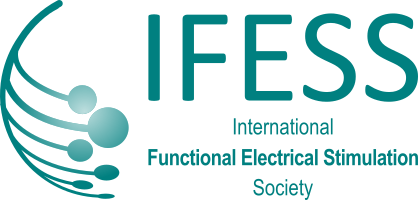IFESS is compiling information of courses related to electrical stimulation therapies, spinal stimulation or brain stimulation that are currently offered in the world.
IFESS is not responsible for the contents of these courses.
Course on Motor learning and Functional Electrical Stimulation – an evidence-based synergy
International FES Centre® (Nottwil, Switzerland) and online via Zoom
The objective of the course is to learn the basic theoretical and practical principles of the treatment using functional electrical stimulation in neurorehabilitation targeting motor learning.
Course Dates: November 15 – November 16, 2024
Accreditation: SGPMR Credits are requested
Length of time: 2 days
Format: Physical and online
Target audience: Physicians working within the fields of neurology, orthopaedics, rehabilitation and paediatrics;
Physiotherapists, occupational therapists and human movement scientists working in the clinical or private practice settings who are treating patients with diseases affecting the central or peripheral nervous system
Contact email: medizinischedienste@paraplegie.ch
Web address: https://www.paraplegie.ch/spz/en/course-motor-learning-and-functional-electrical-stimulation-evidence-based-synergy-international/
Updated on 16 Apr 2024
Upper limb FES course
Salisbury, UK and on request at other sites
The course is aimed at clinicians working in the rehabilitation of people with stroke, head injury, cerebral palsy and spinal cord injury. The course begins with the theory that underpins FES and its use to promote neuroplasticity, control of spasticity and muscle strengthening. Applications are then described for shoulder subluxation, arm and hand rehabilitation. Participants practice FES on each other and with patient volunteers. The course includes a 2 month loan of a Microstim 2v2 exercise stimulator.
The course is held approximately 6 times a year.
Accreditation: Not accredited
Length of time: 1 day tuition, 2 month loan of device
Format: Physical
Target audience: Health care professionals or students
Contact email: fescoursesadmin@odstockmedical.com
Web address: https://odstockmedical.com/healthcare-professionals/training-courses/
Updated on 22 Oct 2021
Lower Limb FES course
Salisbury, UK and on request at other sites
The course introduces the theory underpinning FES and teaches the use of the ODFS Pace. The course covers correction of dropped foot, gait training using other muscle groups and exercise stimulation. Participants practice on themselves and with patient volunteers. The course includes a two month loan of an ODFS Pace. The device has applications in stroke, MS, iSCI, head injury, Parkinson’s disease, cerebral palsy and similar upper motor neurone conditions. There is an online version of the course which covers the same material with approx. 8 hours self guided online learning. The course includes a 2 month loan of the device and an 1 hour live online seminar. Courses are held approximately monthly.
Accreditation: The course is required for a clinician to be allowed to purchase an ODFS Pace
Length of time: 1 day tuition, 2 month loan of device
Format: Online + Physical
Target audience: Health care professionals or students
Contact email: fescoursesadmin@odstockmedical.com
Web address: https://odstockmedical.com/healthcare-professionals/training-courses/
Updated on 22 Oct 2021
Functional Electrical Stimulation in Neurorehabilitation
Online, University of Toronto, Canada
Functional electrical stimulation (FES) is a valuable therapeutic tool for the restoration and retraining of voluntary motor function, and is commonly used in the treatment of patients with spinal cord injury, stroke, and multiple sclerosis. Physical therapists and occupational therapists will benefit from the evidence-based, clinically focused approach to FES provided in this course, which includes six weeks of online instruction comprised of pre-recorded lectures, live webinars, self-directed hands-on activities, additional readings, and online quizzes. The course is designed for therapists based nationally and internationally to advance their knowledge and practice in the use of FES.
This online course is organized into six units, each of which is covered in one week of class time. Over the course of each week, you are expected to watch one pre-recorded lecture (0.5-1 hours), participate in one live webinar (1 hour) (webinars are recorded for those with scheduling conflicts), and complete one or two short self-directed hands-on activities. In addition, online quizzes are scheduled each week and discussion boards are open for ongoing Q&A about course content. You can expect to spend between four and six hours per week on the course.
Live webinars will be scheduled based on learner availability.
Course Dates: January 20 – March 2 2024
Format: Online
Target audience: Physical and occupational therapists
Course instructor: Kristin Musselman BSc, BScPT, MSc, PhD
Contact email: kristin.musselman@uhn.ca
Web address: https://www.physicaltherapy.utoronto.ca/news/functional-electrical-stimulation-neurorehabilitation-course
Updated on 7 Oct 2023
Fundamentals for Building Neural Prosthetic Devices
ANCtoolkit.com
What I have learned over fifty plus years while building six neural prosthetic devices. Two devices in commercial production, one under used in patients at the research level, one having FDA IDE approval but didn’t get into human, and two that went into humans but not into commercial production.
Accreditation: Taught at Case Western Reserve University as regular course for three credit hours
Length of time: Can be modified
Format: Online
Target audience: Engineers planning to work in the neural prothesis area, regulators, clinical engineers
Contact email: jtm3@case.edu
Web address: ANCtoolkit.com
Updated on 22 Oct 2021
Fundamentals of Electrical Stimulation
University of Freiburg, Freiburg (Germany)
The course introduces the medical and biological as well as the physico-chemical and technical aspects of electrical stimulation. In detail, students get familiar with the following topics: Overview of the history of electrical stimulation; Anatomy and physiology of nerve and muscle; Description of nerve excitation; Electrical fields and electrochemical processes at electrodes; Electrode designs and applications; Characteristic parameters during technical excitation of nerves; Methods for selective stimulation; Effects of chronic electrical stimulation; Limits of safe electrical stimulation; Systems theory aspects of control of neural prostheses; Simulation of nerve excitation; Stimulator design; Overview of stimulation parameters in clinical applications. Finally, the content of the course and the learning targets will be summarized together with the students to facilitate the preparation of the oral examination.
Accreditation: study programs with 3 ECTS (note that the course programs are accredited, not the single courses and there is no accreditation in medical programs available)
Length of time: 14 lectures à 90 min (3 ECTS)
Format: Online + Physical
Target audience: Engineering and Neuroscience students in Master programs
Contact email: thomas.stieglitz@imtek.uni-freiburg.de
Updated on 26 Oct 2021
